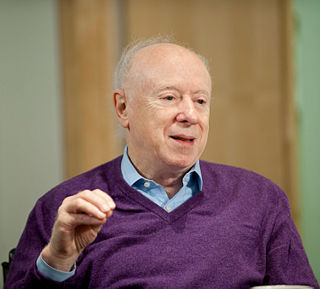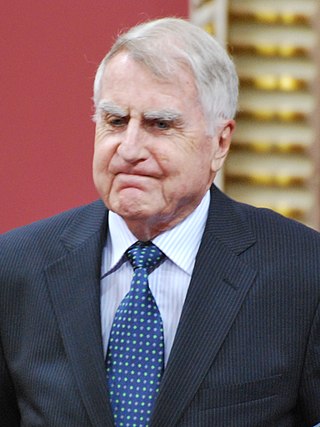Related Research Articles
Gina Bari Kolata is an American science journalist, writing for The New York Times.

Joseph Leonard Goldstein ForMemRS is an American biochemist. He received the Nobel Prize in Physiology or Medicine in 1985, along with fellow University of Texas Southwestern researcher, Michael Brown, for their studies regarding cholesterol. They discovered that human cells have low-density lipoprotein (LDL) receptors that remove cholesterol from the blood and that when LDL receptors are not present in sufficient numbers, individuals develop hypercholesterolemia and become at risk for cholesterol related diseases, notably coronary heart disease. Their studies led to the development of statin drugs.
The Pennington Biomedical Research Center is a health science-focused research center in Baton Rouge, Louisiana. It is part of the Louisiana State University System and conducts clinical, basic, and population science research. It is the largest academically-based nutrition research center in the world, with the greatest number of obesity researchers on faculty. The center's over 500 employees occupy several buildings on the 222-acre (0.90 km2) campus. The center was designed by the Baton Rouge architect John Desmond.
The Léo-Pariseau Prize is a Québécois prize which is awarded annually to a distinguished individual working in the field of biological or health sciences. The prize is awarded by the Association francophone pour le savoir (Acfas), and is named after Léo Pariseau, the first president of Acfas.
The Federation of American Societies for Experimental Biology (FASEB), based in Rockville, Maryland, is a non-profit organization of scientific societies in the United States. With a focus on the biological and biomedical sciences, the federation represents scientists in such fields as anatomy, physiology, immunology, biochemistry, molecular biology, toxicology, genetics, and nutrition.
The American Journal of Clinical Nutrition (AJCN) is a monthly peer-reviewed biomedical journal in the fields of dietetics and clinical nutrition.
Eric Ravussin is a professor of human physiology and the director of the Nutritional Obesity Research Center at Pennington Biomedical Research Center in Baton Rouge, Louisiana. He is also the Douglas L. Gordon Chair in Diabetes and Metabolism at the center. Since 2012 he has also been a Boyd Professor at Louisiana State University.

Rudolph Leibel is the Christopher J. Murphy Professor of Diabetes Research, Professor of Pediatrics and Medicine at Columbia University Medical Center, and Director of the Division of Molecular Genetics in the Department of Pediatrics. He is also co-director of the Naomi Berrie Diabetes Center and executive director of the Russell and Angelica Berrie Program in Cellular Therapy, Co-director of the New York Obesity Research Center and the Columbia University Diabetes and Endocrinology Research Center.

LSU Health Shreveport is a public university focused on health sciences education and located in Shreveport, Louisiana. It is part of the Louisiana State University System and is composed of three schools: the School of Medicine, School of Graduate Studies, and School of Allied Health Professions. The School of Medicine offers the Doctor of Medicine degree, while both the Schools of Graduate Studies and Allied Health offer Bachelor's degrees, Master's degrees, and Doctorate degrees. The School of Medicine also offers 17 residency and 34 fellowship training programs through the Office of Graduate Medical Education.

Claude C. Roy was a Canadian doctor in Quebec. He is considered one of the founding fathers of the field of paediatric gastroenterology.
George A. Bray is an American obesity researcher. As of 2016, he is a University Professor emeritus and formerly the chief of the division of clinical obesity and metabolism at Louisiana State University's Pennington Biomedical Research Center in Baton Rouge. He is also a Boyd Professor emeritus at the Pennington Center, and a professor of medicine emeritus at the Louisiana State University Medical Center.
Molly S. Bray is an American geneticist, currently the Susan T. Jastrow Human Ecology Chair for Excellence in Nutritional Sciences at University of Texas at Austin. Bray is a nationally recognized expert and a featured speaker on the genetics of obesity, energy balance, and exercise response. She is a Professor and chair in the Department of Nutritional Sciences at the University of Texas at Austin, with a master's degree in Exercise Physiology from the University of Houston and a PhD in Human and Molecular Genetics from the UT Graduate School of Biomedical Sciences. She also served as the former Director of the Heflin Center for Genomic Science Genomics Core Laboratory at the University of Alabama at Birmingham and the Children's Nutrition Research Center/Baylor College of Medicine Genetics Core Laboratory. Bray's research focuses on the relationship between energy balance and lifestyle factors such as exercise, nutrition, and circadian patterns of behavior. Her findings related to how the timing and quality of energy intake affect weight gain and metabolic health have been featured on national and international news programs and a myriad of websites and popular news media. Bray also currently leads one of the largest genetic studies of exercise adherence established to date, the Training Interventions and Genetics of Exercise Response (TIGER) study, with a total cohort of more than 3,700 individuals. Bray's research has included investigations of aerobic fitness and resting and exercise energy expenditure in children and adolescents, circadian studies of feeding and metabolic response, and clinical studies of morbidly obese adolescents undergoing bariatric surgery. Bray has published extensively in a wide range of peer-reviewed journals and her work has been featured in national and international scientific meetings.
Leanne M. Redman is a physiologist. She is an LPFA Endowed Fellowship Professor at the Pennington Biomedical Research Center of the Louisiana State University System, where she studies childhood obesity. She was lead researcher on a study that found that low-calorie diets decreased the effects of aging. Redman received the 2018 NPA Garnett-Powers & Associates Mentor Award in recognition of support for post-doctorate mentee scholars in her reproductive endocrinology lab. In October 2023, Redman was honored by The Obesity Society with the 2023 TOPS Research Achievement Award, in recognition to her contributions to the field of obesity.
Bernard J. Devlin is an American psychiatrist who is Professor of Psychiatry and Clinical and Translational Science at the University of Pittsburgh. An expert on statistical and psychiatric genetics, he is a fellow of the statistics section of the American Association for the Advancement of Science. He is also a member of the American Society of Human Genetics, the Genetics Society of America, and the International Society for Autism Research. Before joining the faculty of the University of Pittsburgh, he worked at the Yale School of Medicine, where he conducted research with Neil Risch on the utility of DNA tests. He is married to Kathryn Roeder, a professor at Carnegie Mellon University, with whom he often collaborates on research. Topics that Devlin and Roeder have studied together include the genetic basis of autism. Devlin and Roeder have a daughter, Summer.
William T. Cefalu is an American physician-scientist. Cefalu is the chief scientific and medical officer of the American Diabetes Association.
Kent L. Thornburg is an American scientist, researcher and professor. He lives in Portland, Oregon and works at Oregon Health & Science University (OHSU), in the School of Medicine. He is the director for both the OHSU Center for Developmental Health and the Moore Institute for Nutrition & Wellness
James O. Hill is an American obesity researcher who serves as director of the NIH-funded Nutrition Obesity Research Center in the University of Alabama at Birmingham. In 2022, he received a five-year, $10.8 million award as part of the Nutrition for Precision Health (NPH) study through the National Institutes of Health's All of Us Research Program. He served as chair of the Department of Nutrition Sciences in the UAB School of Health Professions from 2018 - 2022. Hill previously served on the faculty of the University of Colorado, where his positions included director of the Colorado Nutrition Obesity Research Center, director of the Center for Human Nutrition, and founding executive director of the Anschutz Health and Wellness Center. He was elected to the National Academy of Medicine in 2014, and has served as president of the American Society for Nutrition and the Obesity Society. He is the co-founder of America on the Move, a non-profit organization promoting lifestyle changes to counteract obesity and related health problems, and the National Weight Control Registry, a prospective study of long-term weight loss that was the largest of its kind as of 2018.
Tiffany M. Stewart is an American clinical psychologist and the Dudley and Beverly Coates Endowed Professor at Pennington Biomedical Research Center of the Louisiana State University System.

Claude Laberge is a physician-geneticist and a Professor Emeritus of Medicine and Pediatrics at the Faculty of Medicine at Université Laval in Québec City, Québec. He is a pioneer in the field of human genetics.
References
- ↑ "Claude Bouchard, Ph.D". Pennington Biomedical Research Center. Retrieved 2018-07-19.
- ↑ Kolata, Gina (1990-05-24). "Where Fat Is Problem, Heredity Is the Answer, Studies Find". The New York Times. Retrieved 2018-07-19.
- ↑ Kolata, Gina (2002-06-23). "Weights Build Muscles, But Not the Manly Kind". The New York Times. Retrieved 2018-07-19.
- 1 2 "Claude Bouchard". American Physiological Society. Archived from the original on 2018-07-20. Retrieved 2018-07-19.
- ↑ Stern, Judith S.; Kazaks, Alexandra (2015-10-13). Obesity: A Reference Handbook, 2nd Edition: A Reference Handbook. ABC-CLIO. p. 159. ISBN 9781440838057.
- ↑ "Claude Bouchard CV" (PDF). American Physiological Society. Archived from the original (PDF) on 2015-10-04. Retrieved 2018-07-19.
- ↑ "Pennington Biomedical's Claude Bouchard Named an LSU Boyd Professor". Louisiana State University (Press release). 2016-09-09. Retrieved 2018-07-19.